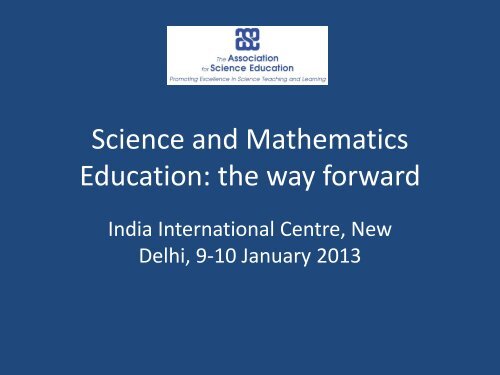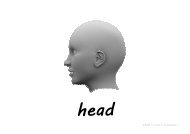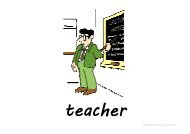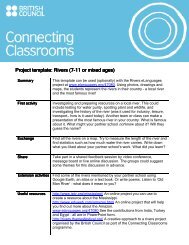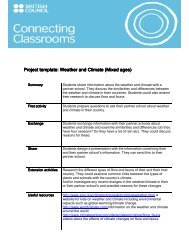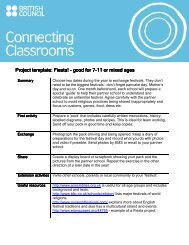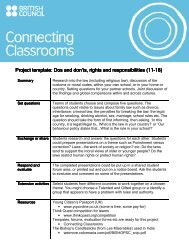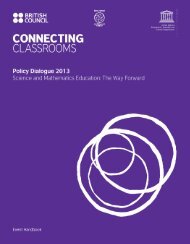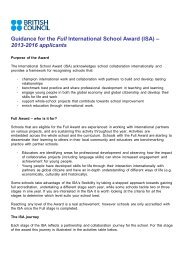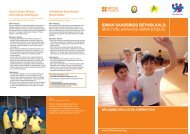Science and Mathematics Education: the way forward
Science and Mathematics Education: the way forward
Science and Mathematics Education: the way forward
- No tags were found...
You also want an ePaper? Increase the reach of your titles
YUMPU automatically turns print PDFs into web optimized ePapers that Google loves.
<strong>Science</strong> <strong>and</strong> <strong>Ma<strong>the</strong>matics</strong><strong>Education</strong>: <strong>the</strong> <strong>way</strong> <strong>forward</strong>India International Centre, NewDelhi, 9-10 January 2013
<strong>Science</strong> teaching across <strong>the</strong> world• The evolution of science teaching• What does good science teaching look like?• How are <strong>the</strong> challenges being addressedacross <strong>the</strong> world?18/06/2013Annette Smith, Association for <strong>Science</strong><strong>Education</strong>, UK2
What is science teaching for? (1)“<strong>Science</strong> teaching in schools …..has one aim ingeneral – namely <strong>the</strong> interpretation of natureto youth”Archer Vassall, <strong>the</strong> first schoolteacher to bePresident of <strong>the</strong> <strong>Science</strong> Masters Association,speaking in 192118/06/2013Annette Smith, Association for <strong>Science</strong><strong>Education</strong>, UK3
What is science teaching for? (2)• The economic argument• The utility argument• The democratic argument• The cultural argument(from Professor Robin Millar’s PresidentialAddress to ASE Conference January 2012)18/06/2013Annette Smith, Association for <strong>Science</strong><strong>Education</strong>, UK4
The evolution of science education –<strong>the</strong> story so far…..“Young people must be taught science well sothat <strong>the</strong>y will be able to underst<strong>and</strong> <strong>and</strong>contribute to solutions for <strong>the</strong> big problems thatface <strong>the</strong> world – <strong>the</strong> global challenges”or……..18/06/2013Annette Smith, Association for <strong>Science</strong><strong>Education</strong>, UK5
• an individual economy needs a good supply ofscientists, ma<strong>the</strong>maticians <strong>and</strong> engineers in order tocompete with o<strong>the</strong>rs, or• in some countries, <strong>the</strong> requirement for scientists,ma<strong>the</strong>maticians <strong>and</strong> engineers is seen as <strong>the</strong> routetowards a knowledge economy• countries or regions subject to problems associatedwith disease, climate change, famine etc needscientifically trained citizens to help solve <strong>the</strong>seproblems• <strong>the</strong>re is an enthusiasm for all education, includingscience18/06/2013Annette Smith, Association for <strong>Science</strong><strong>Education</strong>, UK6
The challenges for science education• <strong>Science</strong> is difficult to teach• <strong>Science</strong> is constantly developing• Aspects of scientific knowledge <strong>and</strong> itsapplication have ethical concerns• There is considerable inequality in <strong>the</strong> take up<strong>and</strong> interest in science from among differentgroups of young people18/06/2013Annette Smith, Association for <strong>Science</strong><strong>Education</strong>, UK7
What does good science educationlook like?18/06/2013Annette Smith, Association for <strong>Science</strong><strong>Education</strong>, UK8
18/06/2013Annette Smith, Association for <strong>Science</strong><strong>Education</strong>, UK9
18/06/2013Annette Smith, Association for <strong>Science</strong><strong>Education</strong>, UK10
18/06/2013Annette Smith, Association for <strong>Science</strong><strong>Education</strong>, UK11
18/06/2013Annette Smith, Association for <strong>Science</strong><strong>Education</strong>, UK12
18/06/2013Annette Smith, Association for <strong>Science</strong><strong>Education</strong>, UK13
18/06/2013Annette Smith, Association for <strong>Science</strong><strong>Education</strong>, UK14
Annette Smith, Association for <strong>Science</strong>18/06/2013 15<strong>Education</strong>, UK
Annette Smith, Association for <strong>Science</strong>18/06/2013 16<strong>Education</strong>, UK
Annette Smith, Association for <strong>Science</strong>18/06/2013 17<strong>Education</strong>, UK
What should good science teachingcontain?• <strong>Science</strong> lessons should often contain some practicalwork• Students should be engaged – questioning is veryimportant• All students must be involved in <strong>the</strong> learning – it is <strong>the</strong>teacher’s job to ensure that <strong>the</strong>ir teaching is inclusive• Lessons should have pace, students should be aware of<strong>the</strong>ir learning <strong>and</strong> <strong>the</strong> goals of <strong>the</strong> learning• Teaching should take place with appropriate numbersof students in a class18/06/2013Annette Smith, Association for <strong>Science</strong><strong>Education</strong>, UK18
Hattie (2010) Top Ten of aspects thatimprove learning – all about <strong>the</strong> teacher• High expectations• Piagetan programmes• Early interventions• Teacher credibility (includes subject knowledge <strong>and</strong>classroom management)• Provision of formative evaluation• Teacher video• Classroom discussion• SEN intervention• Teacher clarity• Provision of feedback18/06/2013Annette Smith, Association for <strong>Science</strong><strong>Education</strong>, UK19
The top ten list applied to girls inscience• High expectations – do you expect girls to achieve asmuch as boys – <strong>and</strong> do <strong>the</strong>y know this?• Piagetan programmes – have you taken account of <strong>the</strong>cognitive development differences between girls <strong>and</strong>boys?• Early interventions – do you ensure that no group fallsbehind ?• Teacher credibility (includes subject knowledge <strong>and</strong>classroom management) – are <strong>the</strong> contexts that youchoose as examples appropriate for girls <strong>and</strong> boys?18/06/2013Annette Smith, Association for <strong>Science</strong><strong>Education</strong>, UK20
The challenges for science education• <strong>Science</strong> is difficult to teach• <strong>Science</strong> is constantly developing• Aspects of scientific knowledge <strong>and</strong> itsapplication have ethical concerns• There is considerable inequality in <strong>the</strong> take up<strong>and</strong> interest in science from among differentgroups of young people18/06/2013Annette Smith, Association for <strong>Science</strong><strong>Education</strong>, UK21
How is this addressed?At <strong>the</strong>se levels:• Governments <strong>and</strong> policy level• Country to country• Individual classrooms18/06/2013Annette Smith, Association for <strong>Science</strong><strong>Education</strong>, UK22
Governments <strong>and</strong> policy level18/06/2013Annette Smith, Association for <strong>Science</strong><strong>Education</strong>, UK23
Huge importance given to tests:18/06/2013Annette Smith, Association for <strong>Science</strong><strong>Education</strong>, UK24
And data used in inappropriate<strong>way</strong>s…….18/06/2013Annette Smith, Association for <strong>Science</strong><strong>Education</strong>, UK25
Country to country exchanges –ASE 201318/06/2013Annette Smith, Association for <strong>Science</strong><strong>Education</strong>, UK26
Useful comparisons of practice <strong>and</strong>policyNGSS Second <strong>and</strong> Final Public Draft tobe Released Tuesday, January 8Mark your calendars. The second (<strong>and</strong>final) public draft of <strong>the</strong> NextGeneration <strong>Science</strong> St<strong>and</strong>ards (NGSS)will be released on Tuesday, January 8,at 3 p.m. Eastern.As with previous drafts, Achieve <strong>and</strong>NSTA encourage teachers to review <strong>the</strong>draft <strong>and</strong> provide feedback online toAchieve during <strong>the</strong> comment period,which ends January 29.National Curriculum <strong>Science</strong> Event -<strong>the</strong> draft Primary Programme of Study- 5 July 2012Summary of main issues18/06/2013Annette Smith, Association for <strong>Science</strong><strong>Education</strong>, UK27
Individual classrooms <strong>and</strong> schools18/06/2013Annette Smith, Association for <strong>Science</strong><strong>Education</strong>, UK28
18/06/2013Annette Smith, Association for <strong>Science</strong><strong>Education</strong>, UK29
Successful international sharing ofgood practice – Getting Practical18/06/2013Annette Smith, Association for <strong>Science</strong><strong>Education</strong>, UK30
Positive features• Collaborative project• Meaningful practical work• Questioning <strong>the</strong> purpose of all practical work• Research programme alongside professionaldevelopment in a feedback loop, affecting <strong>the</strong>next phase• Surprising <strong>and</strong> useful outcomes• International context – ASE Annual Conferencesharing good practice18/06/2013Annette Smith, Association for <strong>Science</strong><strong>Education</strong>, UK31
Challenges….• Define <strong>the</strong> purpose of science education in2013 <strong>and</strong> for 2020 <strong>and</strong> beyond• Work out exactly what good science teaching<strong>and</strong> learning looks like, <strong>and</strong> how to achievethat in every classroom• Share good practice with appropriate use ofresearch data <strong>and</strong> sustainable initiatives18/06/2013Annette Smith, Association for <strong>Science</strong><strong>Education</strong>, UK32
18/06/2013Annette Smith, Association for <strong>Science</strong><strong>Education</strong>, UK33


